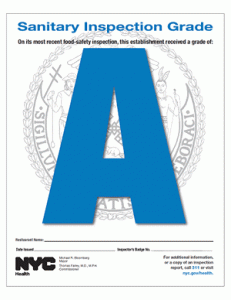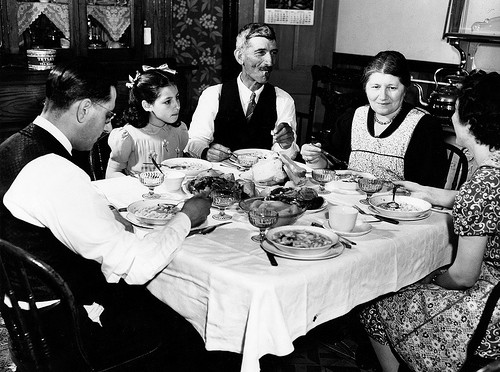 Nothing instills fear in the hearts of restaurant workers more than a visit from the health department. A failed inspection can be a death knell for even the most popular restaurant. In today’s world, it’s become a highly politicized process and—if you want to pass the test—you have to be prepared. Waitstaff and kitchen employees typically have a “fire drill” in place for when an inspector arrives. For the front-of-house this involves discarding anything that may trigger a deduction—wet rags that are used to crumb tables, fruit garnishes for cocktails, or any containers that aren’t labelled and dated. Meanwhile back-of-house scrambles to put on latex gloves and chef’s hats even though most of them weren’t properly outfitted when the inspector arrived. During the inspection, service grinds to a halt as the entire staff walks on eggshells to avoid missteps. Continuing to cook food only increases your chances of a violation, so the chefs lay down their knives. Oblivious diners stuck waiting for their food can only snack on our apologies until it’s over. The moment the inspector leaves, we put everything back where we need it to be: hats and gloves off, fruit garnishes exposed to the elements, and crumbing rags moist and ready. We know better than the Health Department what makes restaurants work properly and—while we respect their authority—everything runs so much better when they’re not around.
Nothing instills fear in the hearts of restaurant workers more than a visit from the health department. A failed inspection can be a death knell for even the most popular restaurant. In today’s world, it’s become a highly politicized process and—if you want to pass the test—you have to be prepared. Waitstaff and kitchen employees typically have a “fire drill” in place for when an inspector arrives. For the front-of-house this involves discarding anything that may trigger a deduction—wet rags that are used to crumb tables, fruit garnishes for cocktails, or any containers that aren’t labelled and dated. Meanwhile back-of-house scrambles to put on latex gloves and chef’s hats even though most of them weren’t properly outfitted when the inspector arrived. During the inspection, service grinds to a halt as the entire staff walks on eggshells to avoid missteps. Continuing to cook food only increases your chances of a violation, so the chefs lay down their knives. Oblivious diners stuck waiting for their food can only snack on our apologies until it’s over. The moment the inspector leaves, we put everything back where we need it to be: hats and gloves off, fruit garnishes exposed to the elements, and crumbing rags moist and ready. We know better than the Health Department what makes restaurants work properly and—while we respect their authority—everything runs so much better when they’re not around.
Category: Restaurant Life
The Dysfunctional Family

“Do you get to eat whatever you want off the menu every night?” a naive guest will invariably ask, usually when you’re in the shits. “You’re so lucky,” they’ll say, enraptured in their meal and drunk on the illusion of your privilege. Restaurants that allow their waitstaff to order food directly from the menu are a dying breed. Escalating food costs make it prohibitive for restaurateurs to feed employees á la carte, but most states legally require restaurants to provide meals. This presents an ethical challenge—feeding your staff nourishing food while spending as little money on it as possible. It often leads to a conflict of interest and some of the most inventive cooking with repurposed food in history. Not every restaurant skims on family meal; the gamut runs from troughs of unidentifiable gruel made with the cheapest ingredients imaginable to menu-worthy dishes incorporating superfluous inventory of high-quality produce.
The “family meal,” as we call it, is the nervous center of the restaurant universe. Collectively, we sit for at least a half an hour every night and dine together. Before we discuss menu changes and relevant service issues, we sit down for supper like a family, albeit a dysfunctional one. It is the calm before the storm, a moment of peace where we are reminded of our humanity before we spend the evening effacing ourselves in service of the comfort of others.

Friendships crystallize at the family table, lasting bonds akin to army buddies whose experiences at war lead to a lifetime of trust and companionship. We swap stories of good and bad meals we’ve had dining on enemy soil and gossip about the drama of the day—who’s sleeping with whom on the staff or the shitty tipper from the night before. We share stories about each other’s dreams, nurturing our alter egos behind the apron and inspiring each other closer to freedom. For those who aspire to a career in hospitality, we pray for their souls and do our best to talk them out of it. Faces come and go quite frequently in restaurants, but no matter who we are at the dinner table we share the frustrations of feeling overworked and a slave to our service jobs. We’re tired.
After a hard night, we’ll sit down again at the bar and share a “shiftdrink” if our overlords are kind enough to sanction one. And we drink—to a more prosperous tomorrow, to better tips, a better job, or emancipation…hopefully not a manager position. We will try to ignore the urge to go drinking after work and stay out until 4 AM again but it probably won’t work. With these strong bonds we’ve formed it soothes the pain to have each other’s company long after the last check has been closed and we’ve tallied our earnings for the night. We are bound together not only in friendship but by our desire to make a better future for ourselves much healthier than this crazy business can provide. The fact that we have each other makes even the worst family meal palatable.
